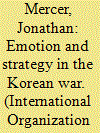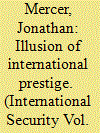| Srl | Item |
| 1 |
ID:
120162


|
|
|
|
|
| Publication |
2013.
|
| Summary/Abstract |
What makes a diplomatic or military signal credible? In strategic settings where deception is possible, rational actors' interpretations rely on their beliefs, intuition, and imagination-they rely on emotion. Two properties of emotion-as an assimilation mechanism and its use as evidence-are key to addressing four strategic problems. First, emotion explains why actors worry needlessly about their reputations. Second, emotion is important to understanding costly signals. Third, emotion explains radical changes in preferences. Fourth, emotion sharpens understanding of strategic problems without being self-invalidating: common knowledge of emotion's effects do not always change those effects. Understanding how rational actors think requires turning to emotion. Evidence from the Korean War captures strengths and weaknesses of competing perspectives.
|
|
|
|
|
|
|
|
|
|
|
|
|
|
|
|
| 2 |
ID:
093818


|
|
|
|
|
| Publication |
2010.
|
| Summary/Abstract |
A belief in alien abduction is an emotional belief, but so is a belief that Iran intends to build nuclear weapons, that one's country is good, that a sales tax is unjust, or that French decision makers are irresolute. Revolutionary research in the brain sciences has overturned conventional views of the relationship between emotion, rationality, and beliefs. Because rationality depends on emotion, and because cognition and emotion are nearly indistinguishable in the brain, one can view emotion as constituting and strengthening beliefs such as trust, nationalism, justice or credibility. For example, a belief that another's commitment is credible depends on one's selection (and interpretation) of evidence and one's assessment of risk, both of which rely on emotion. Observing that emotion and cognition co-produce beliefs has policy implications: how one fights terrorism changes if one views credibility as an emotional belief.
|
|
|
|
|
|
|
|
|
|
|
|
|
|
|
|
| 3 |
ID:
152918


|
|
|
|
|
| Summary/Abstract |
Policymakers and international relations scholars concur that prestige is critical to world politics because states having prestige enjoy greater authority. An examination of how policymakers assess their and other states' prestige, however, reveals that this traditional view of prestige is wrong, for two reasons. First, policymakers do not analyze their own states' prestige, because they feel they already know it. They use their feelings of pride and shame as evidence of their state's prestige. Second, political and psychological incentives encourage policymakers to explain another state's behavior in ways that make it unlikely that states gain prestige. Policymakers systematically discount the prestige of other states; a belief that their state has earned the respect and admiration of others is therefore illusory. Consequently, the justification for costly prestige policies collapses. In other words, states should not chase what they cannot catch. Evidence from the South African War supports this conclusion.
|
|
|
|
|
|
|
|
|
|
|
|
|
|
|
|
| 4 |
ID:
060948


|
|
|